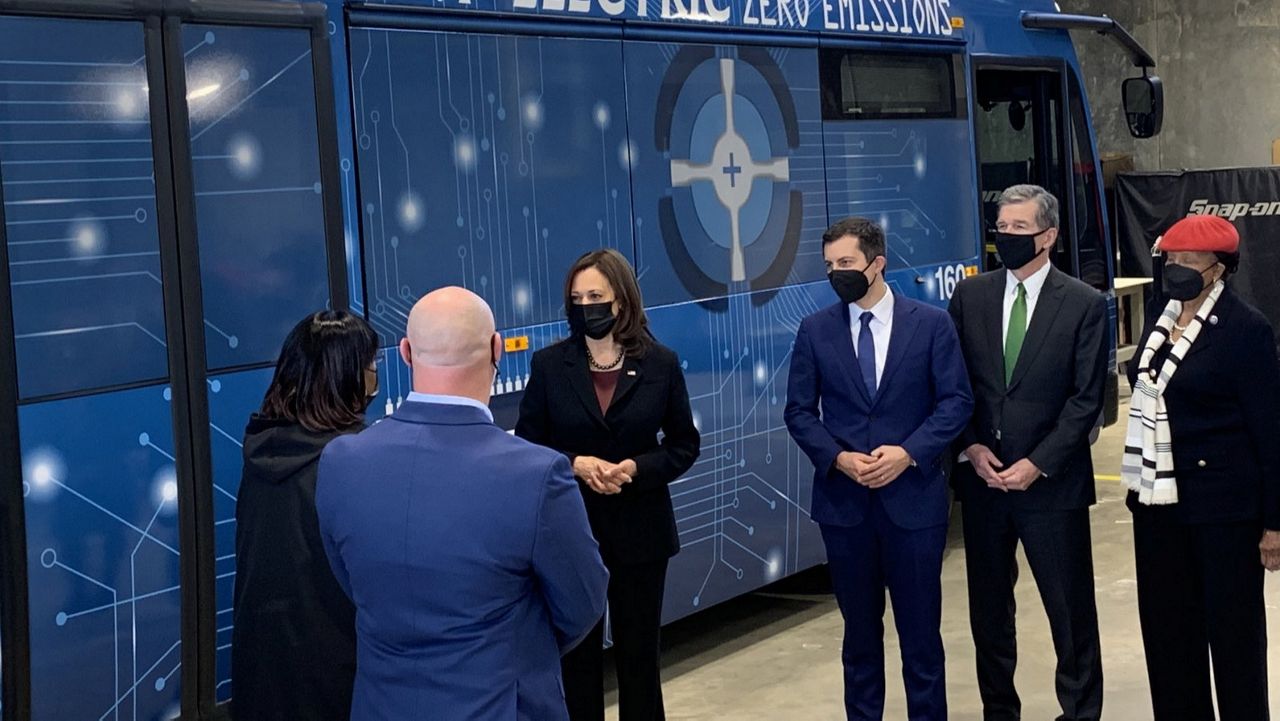Vice President Kamala Harris visited North Carolina Thursday to talk about the Biden administration's plans to make a big investment in the country's infrastructure.
Harris was in Charlotte to talk about the Bipartisan Infrastructure Law, a $1 trillion spending plan designed to upgrade the nation’s highways, bridges and public transit, and help expand broadband access that the president signed into law last month.
"The bottom line is this: World class cities like Charlotte deserve world-class transit systems, and this law is going to help you build those systems," Harris said, speaking outside in front of a Charlotte Area Transit System electric bus.
The vice president and Transportation Sec. Pete Buttigieg visited Charlotte Thursday, touring a city bus depot and meeting with Gov. Roy Cooper and Rep. Alma Adams.
"In states across our nation, public transportation is not as fast or as frequent, as safe or as healthy as it can be," Harris said. "People who use public transportation for their commute often spend much more time in transit, time that they could be spending with their friends and family, helping their children do their homework."
The new law includes almost $90 billion for public transit across the country, with about $910 million going to North Carolina over the next five years. That’s the largest federal investment in public transit ever. It includes funding for things like electric buses to run city routes and big investments, like new rail lines.
Charlotte has led the way in light rail in North Carolina. The city’s Lynx Blue Line runs southwest to northeast across the city, bringing commuters from suburbs into the city center.
The city is also about to begin construction on a new Silver line that will run 26 miles across the county west to east. City leaders hope to open the new line by 2030.
"North Carolina is a state that will benefit enormously from this legislation," Buttigieg said after the event in an exclusive interview with Spectrum News 1. "You’ve got fast-growing communities like Charlotte and the surrounding areas that have enormous infrastructure needs."
The law includes $65 billion nationally to expand broadband access to underserved communities.
"We do this work so that every American can have affordable and accessible high-speed internet connections," she said. High-speed internet will help people who can work from home, give rural areas access to virtual doctor's appointments, and help children do better in school.
"Long gone is Encyclopedia Britannica. They need access to the internet," Harris said.
This is Harris’ second trip to talk up the new infrastructure law. Last month, she visited Columbus, Ohio, to talk about how the spending plan will benefit people there.
Electric vehicles, and the infrastructure needed to keep them moving, is a major part of the plan. The deal includes $7.5 billion to build out a nationwide network of charger stations. It also has funding to build thousands of electric school buses for districts around the country.
The plan includes money to replace “24,000 buses, 5,000 rail cars, 200 stations, and thousands of miles of track, signals, and power systems” for public transit, according to the Biden administration.
"One-hundred and thirty-four years ago, Charlotte unveiled its first ever public transit system," the transportation secretary said. That involved horse-drawn trolleys.
"Soon, new homes, new business and new neighborhoods sprang up along those trolley routes," Buttigieg said. And this new investment will bring the same kind of economic growth.
"Investing to make it more convenient and quicker and easier to get around by transit pays dividends," he said. "It pays off for people who don't own a car or don't want to have to deal with parking and with filling up. Having access to transit means you have better ways to get to jobs and opportunities while saving money."
It also means less traffic for those who do drive and less pollution for the entire community, Buttigieg said.
The vice president, flanked by Buttigieg, Adams and the governor, toured the Charlotte Area Transit System bus garage and met with transit workers.
Harris said the new law includes funding to fix highways, including the 3,000 miles of highways that need repair in North Carolina. The vice president gave a nod to possible repairs to Interstate 85, which runs through Charlotte, bringing applause from the crowd.
The vice president said the new infrastructure law is part one of a two-part push by the Biden administration.
Part two, she said, is the Build Back Better Act, which passed the House last month and is now before the Senate. That bill focuses more on social programs to help bring down the cost of health care and prescription drugs and support child care for working parents.
The Build Back Better Act also includes major shifts to reduce greenhouse gas emissions and increase clean energy.
"The climate crisis is an existential threat and it demands our immediate action," she said.
The infrastructure law took months of negotiations between the president and both parties in Congress.
"It represents something extraordinary, that you saw the bipartisanship that went into this bill. Senators Burr and Tillis were among 19 Republicans who crossed party lines voting with Democrats," Buttigieg told Spectrum News 1, referring to North Carolina's two Republican senators.
"This isn’t a Democrat-Republican thing. You need roads, you need bridges, you need internet and clean water, and nothing about that should be political," he said.
The Build Back Better Act, a major part of the presdient's agenda, will take even more negotiation, politicking and deal making to get it passed through the Senate and to Joe Biden's desk.
Spectrum News Washington Reporter Reuben Jones contributed to this report.



